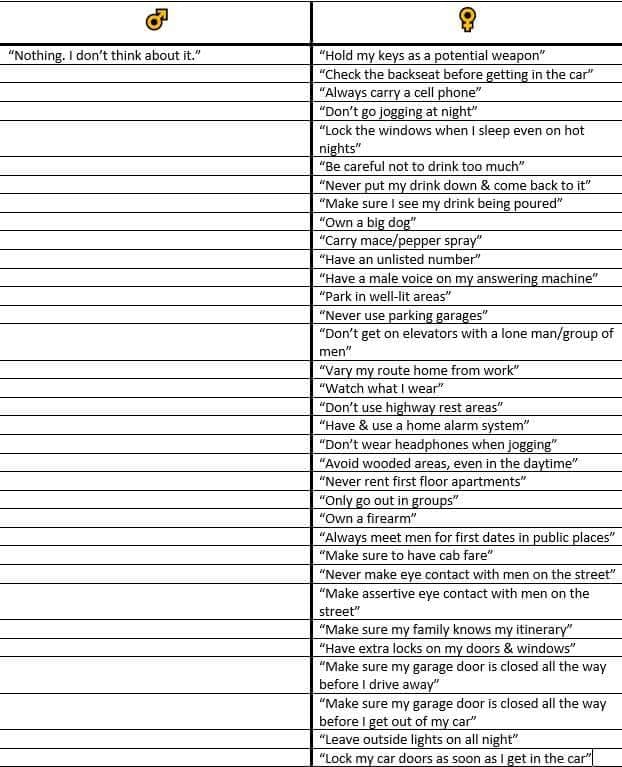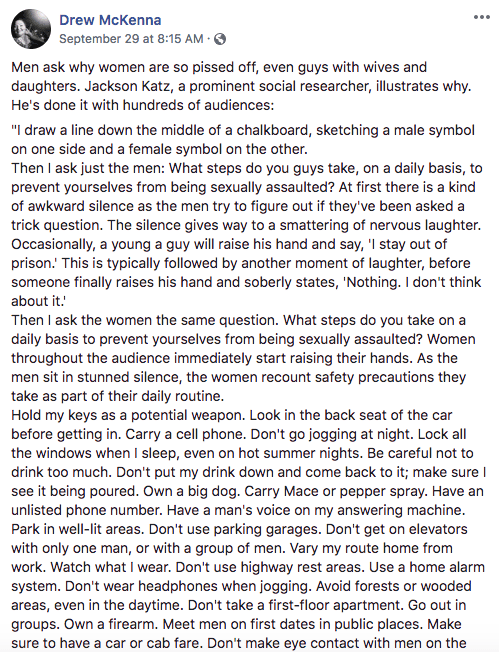If you think that women are angry right now because of, shall we say, the political climate, well, you might not have been paying attention. Women have been mad for ages – we’re just now getting the courage to bring that simmering ire out of the proverbial closet where we’ve been told it belongs and into the public sphere where we can attempt, in no uncertain terms, to defend it.
Because even if our newest supreme court justice is one of the 2% of men accused erroneously of sexual assault, and even if our president stopped demeaning and silencing women for a couple of days, the truth of living life as a female hasn’t changed in decades.
1 in 5 of us will suffer some kind of sexual assault in our lifetime. In an attempt to be the 4 and not the 1, we learn all sorts of tricks from a young age. They’re given to us by the women in our lives, passed down like heirlooms, bits of knowledge that may or may not have served them in their moment of need, but that are better than nothing, dammit!
We park under lights if we’re going to be leaving somewhere at night. We tell someone where we’re going, who we’ll be with, and what time we’ll be home. We carry our car keys like weapons. We divert if it seems like someone is following us, and we never, ever get into our car without checking the backseat for a stranger. Headphones while jogging? Only if you’re asking for it, lady.
If any of these things seem paranoid to you, well, you’re probably male.
And that’s you, and if you’re interested in what other measures women take to avoid aggressive men on a daily basis, this viral Facebook post should be on your radar.
Drew McKenna posted this list from Jackson Katz, a prominent social researcher, with the following caption:
Men ask why women are so pissed off, even guys with wives and daughters. Jackson Katz, a prominent social researcher, illustrates why. He’s done it with hundreds of audiences:
“I draw a line down the middle of a chalkboard, sketching a male symbol on one side and a female symbol on the other.
Then I ask just the men: What steps do you guys take, on a daily basis, to prevent yourselves from being sexually assaulted? At first there is a kind of awkward silence as the men try to figure out if they’ve been asked a trick question. The silence gives way to a smattering of nervous laughter. Occasionally, a young a guy will raise his hand and say, ‘I stay out of prison.’ This is typically followed by another moment of laughter, before someone finally raises his hand and soberly states, ‘Nothing. I don’t think about it.’
Then I ask the women the same question. What steps do you take on a daily basis to prevent yourselves from being sexually assaulted? Women throughout the audience immediately start raising their hands. As the men sit in stunned silence, the women recount safety precautions they take as part of their daily routine.
Hold my keys as a potential weapon. Look in the back seat of the car before getting in. Carry a cell phone. Don’t go jogging at night. Lock all the windows when I sleep, even on hot summer nights. Be careful not to drink too much. Don’t put my drink down and come back to it; make sure I see it being poured. Own a big dog. Carry Mace or pepper spray. Have an unlisted phone number. Have a man’s voice on my answering machine. Park in well-lit areas. Don’t use parking garages. Don’t get on elevators with only one man, or with a group of men. Vary my route home from work. Watch what I wear. Don’t use highway rest areas. Use a home alarm system. Don’t wear headphones when jogging. Avoid forests or wooded areas, even in the daytime. Don’t take a first-floor apartment. Go out in groups. Own a firearm. Meet men on first dates in public places. Make sure to have a car or cab fare. Don’t make eye contact with men on the street. Make assertive eye contact with men on the street.”
― Jackson Katz, The Macho Paradox: Why Some Men Hurt Women and How All Men Can Help.
(The first man to minor in women’s studies at the University of Massachusetts-Amherst, holds a master’s degree from the Harvard Graduate School of Education, and a Ph.D. in cultural studies and education from UCLA.)
He followed it up with a visual that’s stark and should be revealing to the most skeptical among us:

Photo Credit: Facebook
Why do women do this, aside from the obvious answer of “to not get raped?” Well, here’s what I think – we do it because our mothers and aunts did it. Our grandmothers did it. We do it because our culture and society tells us that it’s a woman’s responsibility to not get raped, rather than a man’s responsibility to not rape.
Because if a sexual assault takes place, women know there’s a very good chance we’ll be blamed for it.
What were we wearing? Had we had a drink? Two? More? Did we dare to be alone in a secluded public place? Were we listening to a really great audiobook and forgot, for a minute or five, to check behind us on that running trail? Were we being too much of a bitch? Not being enough of a bitch?
Is it fair? No. But these are the questions we’ll be asked if we say something happened. If we go for help to the people who are supposed to provide it, they’ll want to know. Their eyes will be full of skepticism, and worse, they’ll convey sympathy but disinterest – nothing can be done, they’ll say. It’s her word against his.
So we are vigilant, knowing there’s a very real, statistical probability that it won’t matter in the end. Because we want to be able to tell ourselves, at least, that we didn’t deserve it. That we did everything we could.
Even if society will never believe us. Even if they never even bother to listen to us.
We’ll know we tried. And maybe that’s the real lesson handed down by generations before us, one that’s bitter and hard but nonetheless real – in the end, the only person who will hear the truth are the survivors.
So in all of the preparation, all of the fear and anxiety and double-checking and vigilance, we’re preparing for the day we have defend ourselves, if only while looking in a mirror.








